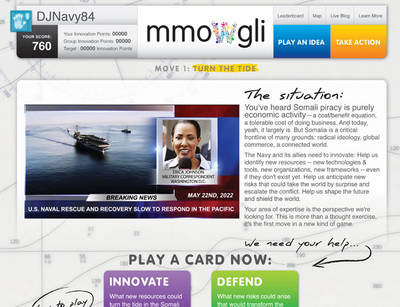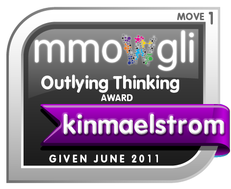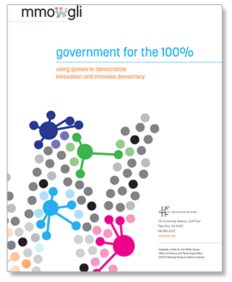Future Now
The IFTF Blog
Government for the 100%: new insights from the MMOWGLI game
What if games will be critical tools for finding new ideas and catalyzing new collaborations to solve our most wicked and intractable problems?
That’s the question we’ve been exploring in MMOWGLI, an ongoing project from the Office of Naval Research, Institute for the Future, and Naval Postgraduate School to evoke fresh insight into serious topics by engaging online crowds through games.

Since we launched in spring 2011, 2700 players have contributed 20,000 ideas across three game events to avert Somali piracy, build an agile Navy for the 21st century, and re-invent the military’s relationship to energy consumption. As the U.S. Navy’s first crowdsourced gaming effort, MMOWGLI has been covered by the New York Times, Wall Street Journal, NPR, MSNBC, Washington Post, Wired, and Scientific American.
We’ve learned a few lessons along the way: how to harness the power, and accept the limitations of games, and how to guide, sustain, and respect the energy of our players. In our new paper Government for the 100% Using Games to Democratize Innovation and Innovate Democracy, my co-author Garth Jensen (U.S. Navy) and I share what we’ve learned building MMOWGLI games and collaborating with the amazing community of MMOWGLI players.
In the paper we've distilled our experience into five design patterns. We hope our own best practices can inform other emerging forms online participation—serious games and crowdsourced innovation challenges like MMOWGLI, online learning platforms and massively open online courses, and early experiments in participatory governance.
From the paper, here are three of our insights:
- Tell a story together. Our brains are hard-wired for narrative. A compelling story can make the difference between half-hearted involvement and all-in engagement, even when we have to work to finish the story. Some of the most successful interactive games of the past decade immersed players in intricate plots and sympathetic characters, but efforts to ‘gamify’ participation often focus on quantified rewards at the expense of storytelling. For each MMOWGLI game we imagined a fictional-yet-plausible scenario, like an imagined global crisis (like the energyMMOWGLI scenario video below) that needs to be resolved or an epic opportunity to change the world. But each MMOWGLI game only introduced these stories, leaving a “narrative whitespace” for our players to imagine an ending and create the future through their own ideas and dialogue.
- Bring your own background. We launched MMOWGLI to break open old silos and inject fresh thinking into problems that have been well-studied by more traditional means. To find these thinkers we worked hard to recruit players from academia, government, military, industry, and citizens with diverse skills, experiences, and areas of expertise. But bringing new people to the table wasn’t enough to assure truly new ideas. Throughout gameplay we urged players to filter our challenge through their own personal backgrounds, not tell us what we might want to hear. We launched themed ‘mini-challenges’ to encourage potential solutions from all angles—technical, political, economic, and social and cultural approaches. Our game facilitation team continually highlighted and rewarded unconventional approaches and outlying—even crazy—ideas.

- Reward dialogue, not ideas. Designer John Thackara has proposed that the complex wicked problems of the 21st century are best addressed not by generating more “single-vision top-down blueprints” but by catalyzing ongoing “conversations”. We hard-coded this shift into the MMOWGLI platform. Players’ ideas are limited to 140 characters to encourage back-and-forth interactions over individual manifestos. Our scoring incentives directly support this—the fastest way to earn points in MMOWGLI is by expanding on existing ideas from other players.
We’re convinced that early efforts like MMOWGLI are just the beginning of a big shift, from closed approaches to solving problems to massively multiplayer democracies. We see a future where participation in our civic institutions is transformed by ubiquitous gaming: where the many, not just the select few, are consistently engaged in addressing the most pressing challenges, and where anyone, not just those with access to resources, has an opportunity to change the game.
The MMOWGLI team wants to do our part to help. In early 2013 we’ll make everything about MMOWGLI open source, including the code behind the platform and a series of ‘instructables’ on how to design, run, and interpret a MMOWGLI game. We’re working to make the MMOWGLI platform as-is easily repurposeable by anyone wanting to engage a community in gameful problem solving. And we’ll invite everyone to expand or improve on our work so far, through code or game design.
Download Government for the 100% (PDF), and please share any feedback with us at jtester [at] iftf.org and garth.jensen [at] navy.mil
[Government for the 100% was originally written for the White House Office of Science and Technology Policy (OSTP) Working Group on Serious Games]




